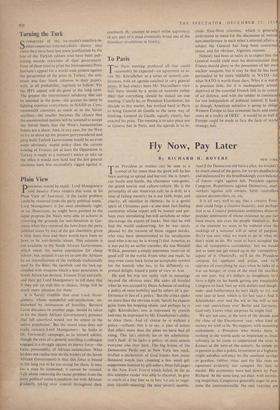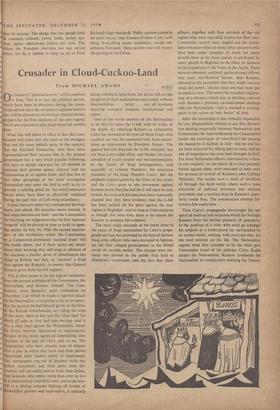Fly Now, Pay Later
y RICHARD H. ROVERE
NEW N'oRk
THE President in motion can be seen as a symbol of far more than the good will he has been seeking to spread and harvest. He is Ameri- can hustle and bustle, the champion vote-getter, the grand tourist and culture-vulture. He is the personality of our American cult; he is drift, in a time of failing mastery; he is our faith, hope, and charity, all manifest in rhetoric; he is a genial spirit of Christmas past—a one-man fact-finding committee whose report will be honest and per- haps even stimulating but will somehow or other discourage the export of bucks. Not that he will find the world undeserving, for he was surely pleased by the turnout of those ragged hordes, who may have demonstrated to his satisfaction (and who is to say he is wrong?) that America, as it was put by an earlier traveller, the late Wendell Willkie, possesses a simply enormous 'reservoir of good will' in' the world. From what one reads, he may even come back home an acceptable symbol for the beatnik who has, to his diffidently ex- pressed delight, found a point of view in Asia.
He and his trip are really rich in meanings beyond the obvious ones. His aides all bristled when he was accused by Dean Acheson of making a policy of mere mobility and by others of 'a per- formance in lied of a policy.' But the critics spoke no more than the obvious truth. Surely he expects gains from his hopping about; and perhaps he is right. Khrushchev, too, is impressed by crowds and may be impressed by Mr. Eisenhower's ability to draw them. And of course he is without a policy—without, that is to say, a plan of action that offers more than the plans we have had all along. This isn't entirely his or his administra- tion's fault. If he lacks a policy, so' does almost everyone else over here. The big •brains of the Democratic Party met in New 'York last week. drafted a declaration of God knows how many thousand words (not counting a few small gift suggestions inserted by gift-sellers, three full pages in the New York Times) which failed, so far as this attentive reader was able to discover, to give so much as a tiny hint as to how we are to nego- tiate (double-meaning) the next several months. And if the Democrats did have a plan, we Wouldn't be much ahead of the game, for we are deadlocked and stalemated•by the breathtakingly even.balance of forces—right against left, President against Congress, Republicans against Democrats, steel- workers against mill owners, birth controllers against decontrollers. etc. etc.
It is all very well to say that a creative Presi- dent could forge a creative majority, and perhaps that is so. Creative politicians sometimes discover popular sentiments of whose existence no one has been aware. not even the people themselves. But at the moment we seem to be 'without even the makings of a national will or sense of purpose. We're not sure what we want to do or what we don't want to do. We seem to have accepted the idea of 'competitive coexistence,' but we would just as soon not get mixed up in the 'competitive' aspect of it. (Naturally, we'll let the President compete for applause and praise, and we'll approve of everything he says when he ,talks of a war on hunger, or even of the need for sacrifice on our part, but it's dollars to doughnuts he'd liave a fight on . his hands getting any imaginable Congress to back him up with dollars and dough- nuts—and furthermore he isn't likely to try, not next year at least, which is his last year.) And if Khrushchev ever had the wit or the will to test our real convictions over Berlin and Germany', God only knows what surprises he might lind.
We are not sure, at the turn of the decade and the close of the Eisenhower year, what kind of society we wish to be. We support, with mounting enthusiasm, a President who thinks there is nothing in the world. quite so important as fiscal solvency as he came to understand the term in Kansas at the (urn of the century. So simple an argument as that a public investment in a highway might advake sok ency by the resultant savings in gasoline, rubber, time, and the like rests on equations evidently too complex for him to master. His economics were laid down by Poor Richard. At the same time, we elect, with increas- ing majorities, Congresses generally eager to pro- mote the Commonwealth. No real victories are
Won by anyone. The things that our people hold in common—schools, public lands, transit sys- tems, parks—deteriorate before our eyes. The values the President cherishes are not served either, for he is unable to keep us up to Poor Richard's high standards. Public opinion comes to no one's rescue. One wonders if there is any such thing. Everything seems motionless, except our airborne President. There are few who will mourn the passing of the Fifties.



























 Previous page
Previous page